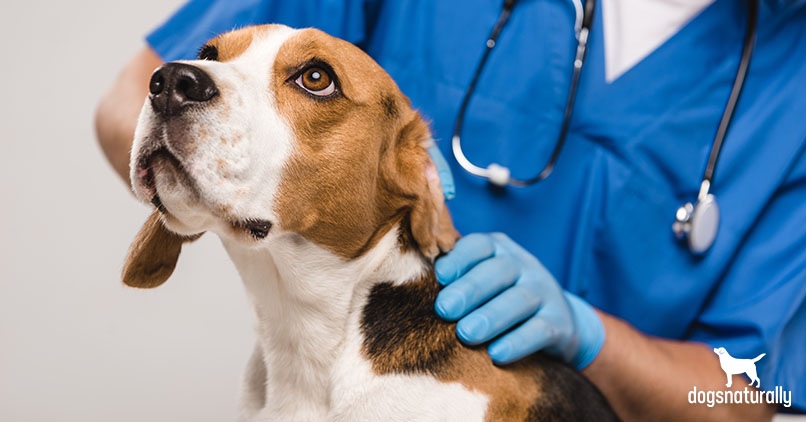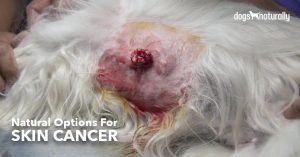The statistics aren’t encouraging when it comes to cancer in dogs. With 65 million dogs in the US, each year there are about 6 million new dog cancer cases. And half of dogs over 10 die from cancer. It’s every dog owner’s worst fear. So you want to be sure you don’t miss the signs your dog might have cancer.
What Are The Signs Of Cancer In Dogs?
If you’re afraid this could happen to your dog … you’re one of millions of dog owners with the same fear. It’s easy to be too vigilant. And then you worry that any little lump, bump or minor ailment means your dog has cancer. (See what Dr Marty Goldstein says about this below).
But you do need to know what to be aware of … so that if your worst nightmare happens, you can catch it quickly. So we asked some leading holistic vets about possible signs of cancer in your dog. These signs don’t always mean your dog has cancer … but, if you notice any of them, it’s a good idea to ask your vet to check your dog.
Here’s what some top holistic vets who treat cancer said when we asked them for the most common signs of cancer in a dog.
Martin Goldstein DVM
Featured in the documentary The Dog Doc, and author of The Nature of Animal Healing. Dr Goldstein offers some important advice … especially if you’re a worrier!
“I don’t like giving people things to look for … because then they start looking for them. The mind is very powerful. And the bond between humans and animals is so strong … that when people start to look for cancer, they can actually create it. It’s more important to observe your dog for “what is.” Don’t look for negative things … look for how great your dog is doing! That’s very, very important.”
Marty Goldstein DVM
Dr Goldstein offered this list of big signs a dog may have cancer:
- Lumps
- Labored breathing
- Severe lethargy
- Pale gums
- Consistent lameness
Richard Pitcairn DVM PhD
Author (with Susan Pitcairn) of Natural Health for Dogs and Cats. Founder of The Pitcairn Institute of Veterinary Homeopathy
Dr Pitcairn says that finding a bump or enlargement is often the most likely way you’ll detect a tumor. Watch for non-specific signs your dog isn’t feeling well … like:
- Lack of appetite
- Unexplained weight loss and wasting … called cancer cachexia. This can happen in late stage cancer, or in dogs treated with chemotherapy
Ian Billinghurst BVSc
Creator of the BARF Diet. Author of Pointing The Bone At Cancer; Give Your Dog a Bone, Grow Your Pups With Bones and The BARF Diet.
Dr Billinghurst explains … “cancer is the master of mimicry.” Apart from obvious surface lumps and bumps, other signs include.
- Weeping sores that don’t heal
- Lameness that won’t go away
- Neurological signs that don’t improve with treatment
Or, says Dr Billinghurst, it could mean something else entirely …
“The trouble is with the more insidious cancers that pretend to be something else. By the time they’re diagnosed, it’s often too late.”
Dr Ian Billinghurst
Like Dr Pitcairn, Dr Billinghurst warns of one telling sign of cancer at an advanced stage. It’s cancer cachexia – the wasting cancer syndrome.
“Now we watch helplessly as the cruelly futile medical merry-go-round accepts another rider.”
RELATED: Read Dr Billinghurst’s opinion on chemo and radiation therapy for dogs with cancer …
Dee Blanco DVM
Homeopathic veterinarian at DrDeeBlanco
Dr Blanco notes that emaciation is a common sign of cancer … especially if it happens rapidly. Undiagnosable disease is often a warning sign. If your dog needs a lot of complex, invasive, expensive diagnostics … that could suggest cancer. Statistically, any dog over six years old is at risk for cancer, especially if they’re …
- Eating a commercial diet
- Receiving frequent vaccinations and drugs
- Exposed to pesticides and other toxins
Patricia Jordan DVM
Author of Vaccinosis – The Mark Of The Beast Hidden In Plain Sight.
Dr Jordan advises watching for any changes in your dog after vaccination.
“In my experience … common signs of cancer like lumps and lameness often follow vaccination.”
Other signs may include …
- Weight loss
- Coughing
- Bleeding from the nose (nasal cancer)
- Bulging eyes (tumor behind the eyes)
Be especially aware if you vaccinate or use pharmaceutical drugs regularly. Also, if you’re a smoker… secondhand smoke can affect your dog … even if you smoke outdoors! All these things can increase the likelihood your dog will develop cancer.
Judy Jasek DVM
Holistic vet at Animal Healing Arts.
Dr Jasek treats a lot of cancer cases holistically. She explains that she tries not to take an “attack the cancer” or “seek and destroy” approach. Instead her goal is to support the patient, keep the cancer from growing … and keep a good quality of life. And she applies this positive, supportive approach … no matter what kind of cancer the pet has. Here are some things to keep an eye on …
- Lumps or unexplained swelling.
- Behavioral changes.
- Not eating.
- Digestive changes, frequent diarrhea or vomiting.
- Abnormal bleeding (in vomit, stool, or nasal discharges).
- Sudden lethargy – even if your dog is getting older.
- Dogs with itchy skin – another sign of chronic inflammation.
- Any chronic problem – means your dog’s body isn’t functioning normally.
- Enlarged lymph nodes.
- Don’t ignore symptoms and let them go on. Especially avoid using drugs to suppress symptoms. This is just a Band-Aid and will lead to deeper problems.
- Be especially alert to changes if your dog is over-vaccinated, eats kibble, or gets pharmaceutical heartworm, flea and tick meds.
If you want to be more proactive …
- Monitor bloodwork – this is tricky because changes can mean many things. But follow up on issues like elevated calcium, white blood count or lymphocytes … or very low blood glucose.
- Check for inflammatory markers – any time the body is inflamed, it predisposes your dog to cancer. All disease begins with inflammation. VDI is a lab that offers tests for various wellness markers, including …
- Inflammatory markers like C-reactive protein
- Vitamin D levels
- Vitamin B12 levels
- Cancer risk assessment
Now you have some professional opinions from top holistic vets on how to monitor your dog for signs of cancer. Keep an eye on your dog’s health and follow up on any significant changes.









